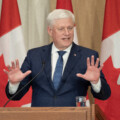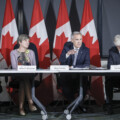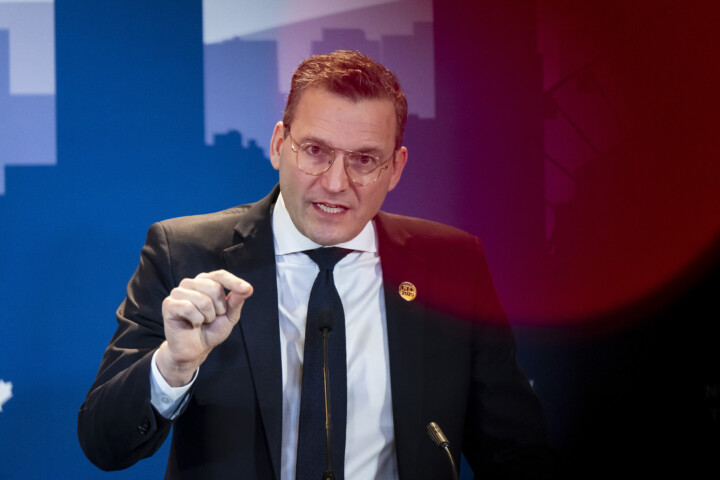Welcome to The Hub’s Federal Election 2021 Policy Pulse, where we’ll be tracking all the policy announcements from the major parties, with instant analysis from our crew of experts.
With the election scheduled for Sept. 20, we’ll be monitoring 36 days worth of policy ideas, so watch out each morning for the day’s live blog where we’ll be tracking every announcement as it happens.
5:30 p.m. — Daily recap: Trudeau promises billions for health care
The Liberals showcased the party’s health-care policies and the Conservatives made an appeal to workers. Here’s the rundown, with more news and analysis below. Visit the Day 9 live blog for our full day of content.
- Liberal leader Justin Trudeau was in Halifax this morning promising to spend $6 billion to reduce wait times in the health-care system and to hire 7,500 doctors, nurses and nurse practitioners, costing $3.5 billion.
- Conservative leader Erin O’Toole promised to give workers representation on the board of directors of large federally-regulated employers. The new rule would apply to federally-regulated employers with more than 1,000 employees or more than $100 million in annual revenue.
4:30 p.m. — After the crisis in Afghanistan, Canada’s role in the world should be an urgent issue in the election campaign
The Hub’s associate editor Amal Attar-Guzman examines The Hub’s new polling data on Afghanistan:
The past week, scores of Canadians were saddened (28 percent) and horrified (24 percent) by the situation occurring in Afghanistan, according to a poll conducted for The Hub by Public Square Research in partnership with Maru/Blue.
In light of recent events, context is needed to understand Canada’s past and recent involvement in Afghanistan, and how they tie into the present situation.
A few days after 9/11, the UN Security Council adopted Resolution 1368 condemning the terrorist attacks. In early October 2001, the United States announced the beginning of armed operations in Afghanistan against al Qaeda and the Taliban. Subsequently, Canada announced its contribution of sea, land and air forces in the operation. For 12 years, under the governments of Jean Chrétien, Paul Martin, and Stephen Harper, Canada would participate in various operations in Afghanistan.
However, due to increasing causalities, declining public support, and the shifting political environment, once the extended mission was completed in 2011, the withdrawal process began. The last 100 CAF members finally left Afghanistan in 2014. From 2001 to 2014, more than 40,000 CAF members served in Afghanistan. In all, 158 CAF members died, along with seven civilians. In the course of the war, more than 2,000 CAF members got injured.
Canadian foreign aid has been allocated to Afghanistan’s reconstruction and development, as well as to improve women’s rights and the living conditions of rural areas. From 2001-2013, $1.63 billion was spent, as well as close to $1 billion post-withdrawal. In the latter period, $966 million was invested on initiatives focused on empowering and supporting Afghan women and girls.
With Kabul falling, not only were Afghans’ lives at risk, Canada’s sacrifices and initiatives fell into jeopardy. CAF personnel were deployed to Kabul last week to aid in the evacuation of Afghan citizens, interpreters, and foreign nationals.
According to our recent polling, eight in 10 are very or somewhat supportive of Canada’s response so far and a large majority (69 percent) think that people who cooperated with Canada and the U.S. are in danger.
Prime Minister Justin Trudeau also announced that his government is aiming to rescue and relocate 20,000 Afghan refugees in Canada. Majorities of Canadians support the initiative, especially 85 per cent of those aged 18 to 34. Currently, approximately 1,000 Afghan refugees are settled in Canada. Close to half (46 percent) think that Canada is doing enough to help, while 33 per cent disagree.
With how Afghanistan unfolding, questions about Canada’s role in the world may be an underlying theme throughout the remainder of the election campaign. The Prime Minister will be attending an emergency G7 meeting on Afghanistan on August 24th and today, he stated that Canada will support G7 sanctions against the Taliban. How this will impact the situation, Canadian public opinion, and the electoral outcome, we will just have to wait and see.
3:30 p.m. — Private clinics could be a vital release valve for post-COVID backlogs
The Hub contributor Joanna Baron examines an under-discussed part of the private health care debate:
The ongoing campaign flap about private health care masks the real looming disaster in the form of delayed surgeries and medical procedures due to COVID-19.
Private clinics have been vital release valves. In B.C., Health Minister Adrian Dix led a rare success story by clearing up 95 percent of his province’s surgical backlog within a year. He did this by contracting out to the province’s many private clinics and waiving rules which forbid “private” physicians from operating on “public” patients.
In Quebec, the prohibition against physicians treating both publicly insured as well as self-paying patients was also waived, and Health Minister Christian Dubé announced he had signed contracts with more than 20 private clinics.
Conservative Party leader Erin O’Toole is correct to emphasize the limits of federal control over health care administration. The Supreme Court of Canada has affirmed that the federal Canada Health Act, while it mandates a universal health care system, does not prohibit private clinics from operating. That is the work of provincial laws — and the provinces are free to make pragmatic decisions to mitigate post-pandemic damage.
3:00 p.m. — Massive infusions of cash tend to lead to stasis, not transformation, in health care
The Hub’s content editor L. Graeme Smith and editor-at-large Sean Speer examine today’s Liberal health-care announcement:
Today Liberal Party leader Justin Trudeau committed $6 billion in new federal funding for provincial and territorial health care. It follows the Conservative Party’s promise to boost the Canada Health Transfer’s growth rate back to “at least 6 percent” per year.
We effectively have a multi-partisan consensus that the federal government must increase federal health transfers in order to improve the performance of provincial and territorial health-care systems.
The problem, though, is modern history suggests otherwise. The 2003-04 Health Accord, which was supposed to “fix health care for a generation,” was basically a big failure. The massive infusion of federal dollars didn’t lead to transformative changes. Instead it essentially bought stasis. Spending rose. Wait-times grew. And the relative performance of Canada’s health-care system fell.
Saskatchewan’s former NDP finance minister Janice Mackinnon, who served in the provincial legislature from 1991 to 2003, attributes the lack of progress to the federal dollars themselves.
As she explained in a 2013 interview with the Macdonald-Laurier Institute:
“I think what prevented change was the money coming from the federal government to the provinces. Why would you change your system and make tough choices if you can just tell some other level of government, “give me money so I don’t have to close these hospitals or I don’t have to have a doctor strike.” It was the money that was coming that was preventing change not the big tough federal government.“
In fact, the history of health-care reform in Canada has tended to correlate with periods of more circumscribed federal involvement. There are various reasons for this — including the perverse incentives associated with an infusion of federal dollars that Mackinnon cites as well as the limits of top-down, centralized priority setting.
The key lesson, then, is that these early campaign commitments of more federal funding for provincial and territorial health-care system are an example of a multi-partisan consensus in which Canadians’ health care would be better served by a case of political divergence.
2:30 p.m. — O’Toole’s worker policies represent a significant shift
The Hub contributor Ben Woodfinden examines the Conservative announcement today:
While it has received relatively little attention, there’s a section of the Conservative platform that represents a substantial departure from previous Tory orthodoxy. The Conservatives say they “will give workers a real voice and the support they need against major multinational corporations.” The platform includes a variety of different promises, O’Toole on Monday highlighted one of these proposals requiring large federally regulated employers to include worker representation on their boards of directors.
With some of these promises the Tories are clearly trying to make a pitch for the “realignment” blue collar voters that have been crucial in reshaping politics in Britain and America. We’ll only know whether this is successful after the election, but the significance of the federal Conservative Party using this kind of language and appealing explicitly to blue collar and union voters should not be dismissed.
Progressives and NDP stalwarts will probably dismiss the move as disingenuous. Plenty of Conservative Party members and MPs probably aren’t enthusiastic about the shift either. But in the event that this shift is successful for the Conservatives we could be seeing a very different Conservative coalition in Canada going forward.
2:00 p.m. — Is giving workers a role in business decisions good for companies? The results are mixed
The Hub’s editor-at-large Sean Speer and content editor L. Graeme Smith take a look at the research on co-determination:
Today Conservative Party leader Erin O’Toole committed to require large federally-regulated companies to include worker representation on their boards of directors.
This practice, which is present in some European countries, including France and Germany, is known as “co-determination.” The basic idea (which can take different forms) is to give workers a role in influencing the business decisions and overall direction of their companies.
The question, of course, is: what are the effects of worker representation on boards of directors?
The research is a bit mixed. It seems to suggest though that, on balance, co-determination can have some modest benefits for workers and firms.
A 2020 study in the Quarterly Journal of Economics, for instance, found that co-determination in Germany had no impact on wages, the wage structure, the labor share, revenue, employment or profitability of the firm, but it increased capital investment.
A 2021 study by the Bureau of Economic Research similarly found that “the European model of codetermination is neither a panacea for all of the problems faced by 21st-century workers, nor a destructive institution that is dramatically inferior to shareholder primacy. Rather, as currently implemented, it is a moderate institution with, on net, nonexistent or small positive effects. Board-level and shop-floor worker representation cause at most small increases in wages, possibly lead to slight increases in job security and satisfaction, and have largely zero or small positive effects on firm performance.”
If The Hub community is looking for competing views on the idea of co-determination, this 2019 discussion between Columbia Law School research fellow Kate Waldock and University of Chicago economist Luigi Zingales is interesting and informative.
12:45 p.m. — Doubling the disability supplement could help reduce poverty rates
The Hub’s editor-at-large Sean Speer examines the Conservative promise to double the disability supplement in the Canada Workers Benefit:
Over the weekend, Conservative leader Erin O’Toole announced a series of disability-related policy commitments, including a promise to double the disability supplement in the Canada Workers Benefit.
The goal of the Canada Workers Benefit (and its disability supplement) is, in colloquial terms, to “make work pay” by smoothing out the marginal effective tax rates that low-income workers face.
Although the Canada Workers Benefit (which is the subject of multi-partisan support) has seen increases in recent years — including a significant one in the 2021 budget — the disability supplement has grown less steadily. It last got a boost in 2019 when it went up by $160 to total of $700.
The Conservatives’ proposed increase, which would raise the disability supplement from $713 to $1,500, would help to offset the loss of benefits for Canadians with disabilities who participate in the workforce.
Boosting work-related support for disabled Canadians has been called for by disability groups in the context of the COVID-19 pandemic. Recent research by University of Toronto professors has shown that Canadians with disabilities or those with chronic health conditions have been disproportionately affected by the pandemic. Almost half of the study’s respondents, for instance, reported that COVID-19 was affecting their ability to pay down debt, make rent and utility payments, or purchase groceries.
The challenges facing Canadians with disabilities aren’t limited to COVID-19 either. Joint research by the Public Policy Forum and Future Skills Centre found that among Canadians aged 25 to 64, the rate of poverty is 40 percent higher for persons with mild disabilities and nearly 200 percent higher for those with more severe disabilities than it is for Canadians without disabilities.
This in large part a function of poor employment outcomes. The pre-pandemic employment rate among working-age Canadians with disabilities was about 60 percent, compared to 80 percent for those without disabilities. (The number is barely 30 percent for Canadians with severe disabilities.)
To the extent that doubling the disability supplement can help more Canadians with disabilities become attached to the workforce, it will raise employment levels and in turn should reduce poverty rates.
11:40 a.m. — Policy expert Samuel Hammond on the Conservative announcement
11:30 a.m. — O’Toole promises to give workers representation on boards of federally-regulated employers
Conservative leader Erin O’Toole promised to give workers representation on the board of directors of large federally-regulated employers.
Speaking in Ottawa this morning, O’Toole said the new rule would apply to federally-regulated employers with more than 1,000 employees or more than $100 million in annual revenue.
The Conservative plan would apply to federally-regulated sectors like aerospace, oil and gas, telecommunications and other industries, which employ hundreds of thousands of Canadians, the party says.
10:00 a.m. — Exclusive poll: Majority of Canadians think Afghanistan withdrawal was the right decision
A majority of Canadians think it was the right decision to withdraw from Afghanistan, although they are worried about the consequences, according to an exclusive new poll conducted for The Hub by Public Square Research in partnership with Maru/Blue.
Fifty-four percent of Canadians think U.S. President Joe Biden did the right thing by withdrawing American forces from Afghanistan after nearly 20 years of conflict.
But since the withdrawal began in early August the crisis has exploded, with NATO countries scrambling to get diplomats, staff and military members out of the country. On Aug. 15, the Taliban seized Kabul, shocking the global community by the speed of their success and sparking a rush to the city’s airport as people tried to flee.
Even now, the airport has been surrounded by crowds so large that seven Afghan civilians have been trampled to death. On the campaign trail, Prime Minister Justin Trudeau has been peppered with questions about what the country is doing to evacuate and resettle Afghans who have co-operated with Canadian forces.
It’s clear from the polling that Canadians are distressed about the situation.
When asked to list their biggest concerns about a Taliban-led Afghanistan, Canadians mostly focused on the mistreatment of women. Seventy-seven percent of respondents said that was their main concern, with 69 percent of people saying they were concerned that people who co-operated with Canada and the U.S. would be in danger. Sixty-six percent were concerned about an increase in terrorist attacks, while 61 percent were concerned about broader instability in the region.
As they travel the country campaigning for the upcoming Sept. 20 election, all the party leaders have fielded questions about the ongoing crisis. Canadians have mixed feelings about which leader would be best to handle the crisis.
Twenty-eight percent of Canadians think Liberal leader Justin Trudeau is the best person to handle the withdrawal, while 22 percent of Canadians think it is Erin O’Toole. Seventeen percent of Canadians say NDP leader Jagmeet Singh is the best person to handle it, while 26 percent say none of these leaders are capable of handling the crisis.
Although the campaign kicked off in the middle of August, when many Canadians are on summer holidays and less likely to be paying attention to the news, the country has been watching closely while the crisis in Afghanistan unfolds.
Eighty-three percent of Canadians are aware of the situation in Afghanistan, with 23 percent saying they are very aware and 60 percent saying they are somewhat aware.
Only four percent of Canadians said they are not aware of the news at all.
Canadians also have strong feelings about the situation. Sixty-six percent of Canadians said the situation is important to them, with 16 percent saying it’s very important and 50 percent saying it’s somewhat important.
Eighty-eight percent of Canadians support the country’s commitment to resettle 20,000 vulnerable Afghans threatened by the Taliban and who are forced to flee. 42 percent are very supportive and 37 percent are somewhat supportive.
This pledge by Trudeau’s government has been uncontroversial on the campaign trail too, with O’Toole promising to honour it if his party forms government.
Canadians aged 18 to 34 are more supportive of welcoming Afghan refugees, by far, with 85 percent supporting the commitment. Seventy-six percent of Canadians 55 years old and older support the commitment.
While Canadians told pollsters they are “horrified” by the scenes out of Kabul recently, it’s not clear that they think Canada can do anything to calm the situation.
Forty-six percent of Canadians say Canada is doing enough to help so far and 21 percent say that Canada is already doing more than enough. Thirty-three percent say Canada is not doing nearly enough to help people in Afghanistan. People aged 18 to 34 are most inclined to say that Canada is not doing enough, with 39 percent urging more action.
Seventy percent of Canadians believe the Taliban should not be recognized as the government in Afghanistan. Both Trudeau and O’Toole agree on this, despite some waffling by Foreign Affairs Minister Marc Garneau.
Nineteen percent of Canadians said they weren’t sure and 7 percent said Canada should recognize the Taliban.
This research was conducted with an online survey of 1,500 Canadians who were selected from the Maru Voice panel. Although the data have been weighted to reflect the make-up of the country, no estimates of sampling error can be calculated because the respondents originally self-selected for the panel.
9:15 a.m. — Liberals promise to spend $6 billion to reduce health-care wait times
Liberal leader Justin Trudeau was in Halifax this morning promising to spend $6 billion to reduce wait times in the health-care system.
Trudeau also promised that under a Liberal government, 7,500 doctors, nurses and nurse practitioners would be hired, costing $3.5 billion.
7:00 a.m. — Exclusive polling released later today
Stay tuned for exclusive polling from The Hub on the ongoing crisis in Afghanistan and how it may affect the election campaign.
6:00 a.m. — The leaders’ daily schedule
Conservative leader Erin O’Toole will make an announcement at 11 a.m. in Ottawa.
NDP leader Jagmeet Singh will make an announcement in Montreal about climate change at 9 a.m.
Liberal leader Justin Trudeau will be in Halifax to make an announcement about health care at 9:30 a.m. local time (8:30 a.m. ET).
Sunday — O’Toole promises action on opioid epidemic
Conservative leader Erin O’Toole promised to treat the opioid epidemic as a health-crisis by injecting $325 million over three years to create 1,000 new treatment beds and build 50 recovery centres across Canada. O’Toole was campaigning in Westminster, British Columbia.
NDP leader Jagmeet Singh said his party would introduce a bill to urge Elections Canada to rename the riding of Toronto–Danforth to Danforth–Layton, to honour the party’s former leader Jack Layton.
Liberal leader Justin Trudeau attended campaign events in New Brunswick and P.E.I.
Saturday — Singh keeps hammering away on housing
Conservative leader Erin O’Toole was in Edmonton on Saturday to announce a plan to increase the disability supplement of the Canada Workers Benefit from $713 to $1,500. The plan would also lower the amount of hours — from 14 per week to 10 per week — that are required to qualify for the disability tax credit and Registered Disability Savings Plan.
NDP leader Jagmeet Singh was in Toronto on Saturday to promise $5,000 in rental support for families.
Liberal leader Justin Trudeau took a break from the campaign trail on Saturday.
Recommended for You

Tale of two provinces: Alberta gains jobs as Ontario loses 67,000 positions

Stephen Harper got the big things right: The Weekly Wrap

Carney’s energy superpower talk isn’t cutting it—we need action

2 in 3 Canadians would rather be born in 1950 than in 2026




Comments (0)